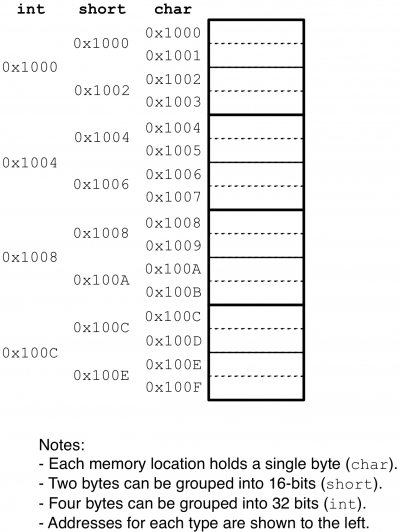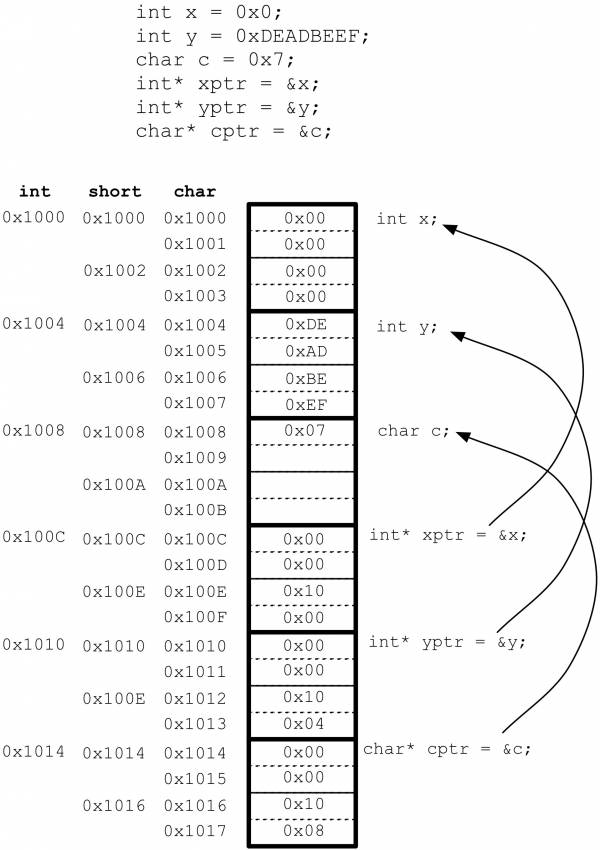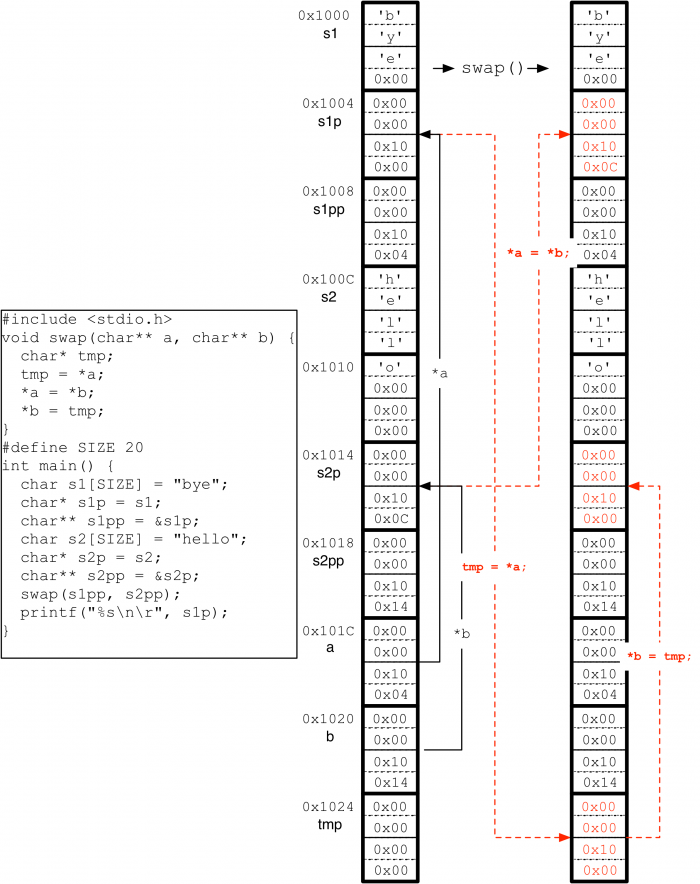#ifdef P1
// Topic: Basic pointers.
// Question: What value with the program print?
#include <stdio.h>
int main() {
int x=4;
int *y = &x;
y++;
printf("%d\n", *y);
}
// Ans:
#endif
#ifdef P2
// Topic: Basic pointers with post-increment
// Question: What value with the program print?
#include <stdio.h>
int main() {
int x = 4;
int y = &x;
y++;
printf("%d\n", y++);
}
// Ans:
#endif
#ifdef P3
#include <stdio.h>
// Topic: Basic pointers with post-increment.
// Question: What value with the program print?
int main() {
int x = 4;
int* y = 5;
y++;
y++;
printf("%d\n", y++);
}
// Ans:
#endif
#ifdef P4
// Topic: Basic pointers with post-increment.
// Question: What value with the program print?
#include <stdio.h>
int main() {
int x = 4;
int* y = &x;
(*y)++;
printf("%d\n", y);
}
// Ans:
#endif
#ifdef P5
// Topic: Basic pointers with post-increment.
// Question: What value with the program print?
#include <stdio.h>
int main() {
int x = 4;
int* y = &x;
(*y)++;
printf("%d\n", *y++);
}
// Ans:
#endif
#ifdef P6
void swap(int a, int b) {
int temp = a;
a = b;
b = temp;
}
#include <stdio.h>
// P6 - P11 are variations on the swap() program.
// See how the various changes to the code impact the results.
// Question: What will this program print?
int main() {
int x = 10, y = 20;
swap(x, y);
printf("%d\n", x);
}
// Ans:
#endif
#ifdef P7
// Question: What will this program print?
void swap(int *a, int *b) {
int temp = a;
a = b;
b = temp;
}
#include <stdio.h>
int main() {
int x = 10, y = 20;
swap(x, y);
printf("%d\n", x);
}
// Ans:
#endif
#ifdef P8
// Question: What will this program print?
void swap(int *a, int *b) {
int temp = a;
*a = b;
b = temp;
}
#include <stdio.h>
int main() {
int x = 10, y = 20;
swap(&x, &y);
printf("%d\n", x);
}
// Ans:
#endif
#ifdef P9
// Question: What will this program print (note that it is printing y)?
void swap(int *a, int *b) {
int* temp = a;
*a = *b;
*b = temp;
}
#include <stdio.h>
int main() {
int x = 10, y = 20;
swap(&x, &y);
printf("%d\n", y);
}
// Ans:
#endif
#ifdef P10
// Question: What will this program print (note that it is printing y)?
void swap(int *a, int *b) {
int temp = a;
*a = *b;
*b = temp;
}
#include <stdio.h>
int main() {
int x = 10, y = 20;
swap(&x, &y);
printf("%d\n", y);
}
// Ans:
#endif
#ifdef P11
// Question: What will this program print (note that it is printing y)?
void swap(int *a, int *b) {
int temp = *a;
*a = *b;
*b = temp;
}
#include <stdio.h>
int main() {
int x = 10, y = 20;
swap(&x, &y);
printf("%d\n", y);
}
// Ans:
#endif
// These questions are related to arrays and pointers.
#ifdef P12
// Topic: Pointer declaration syntax with arrays.
// Question:(T or F) The program below will generate an error or warning when compiled.
#include <stdio.h>
#define SIZE 20
int main() {
char str[SIZE] = "hi there!\n";
char* strp = str;
}
// Ans:
#endif
#ifdef P13
// Topic: Using pointers and arrays.
// Question: What will this program print?
#include <stdio.h>
#define SIZE 20
int main() {
char str[SIZE] = "hi-there!\n";
char* strp = &str[8];
printf("%c\n", strp);
}
// Ans:
#endif
#ifdef P14
// Topic: Using pointers, arrays, and pointer-addressing.
// Question: What will this program print?
#include <stdio.h>
#define SIZE 20
int main() {
char str[SIZE] = "hi-there!\n";
char* strp = &str[7];
printf("%c\n", *(strp+1));
}
// Ans:
#endif
#ifdef P15
// Topic: Using pointers, arrays, and pointer-addressing.
// Question: What will this program print?
#include <stdio.h>
#define SIZE 20
int main() {
char str[SIZE] = "hi-there!\n";
char* strp = &str[1];
printf("%c\n", *(strp++));
}
// Ans:
#endif
#ifdef P16
// Topic: Using pointers, arrays, and pointer-addressing.
// Question: What will this program print?
#include <stdio.h>
#define SIZE 20
int main() {
char str[SIZE] = "hi-there!\n";
char* strp = str;
printf("%c\n", *(++strp));
}
// Ans:
#endif
#ifdef P17
// Topic: Using pointers, arrays, and pointer-addressing.
// Question: (T or F) This program will compile correctly.
#include <stdio.h>
#define SIZE 20
int main() {
char str[SIZE] = "hi-there!\n";
char* strp = str++;
printf("%c\n", *strp);
}
// Ans:
#endif
#ifdef P18
// Question: What does this program print?
#include <stdio.h>
void mystery(char a[]) {
a[1] = 'b';
}
#define SIZE 20
int main() {
char str[SIZE] = "hi-there!\n";
mystery(str);
printf("%c\n", str[1]);
}
// Ans: h, (b), i, none of these
#endif
#ifdef P20
// Question: What does this program print?
#include <stdio.h>
void mystery(char a[]) {
*(a+1) = 'b';
}
#define SIZE 20
int main() {
char str[SIZE] = "hi-there!\n";
mystery(str);
printf("%c\n", str[1]);
}
// Ans:
#endif
#ifdef P21
// Question: What does this program print?
#include <stdio.h>
void mystery(char* a) {
*(a+1) = 'b';
}
#define SIZE 20
int main() {
char str[SIZE] = "hi-there!\n";
mystery(str);
printf("%c\n", str[1]);
}
// Ans:
#endif
#ifdef P22
// Question: What does this program print?
#include <stdio.h>
void mystery(char a[]) {
*(a++) = 'b';
}
#define SIZE 20
int main() {
char str[SIZE] = "hi-there!\n";
mystery(str);
printf("%c\n", str[1]);
}
// Ans:
#endif
#ifdef P23
// Topic: Pointers to pointers and character arrays.
// Question: What does this program print?
#include <stdio.h>
void swap(char* a, char* b) {
char tmp = *a;
*a = *b;
*b = tmp;
}
#define SIZE 20
int main() {
char s1[SIZE] = "hello";
char s2[SIZE] = "bye";
swap(s1, s2);
printf("%s\n", s1);
}
// Ans: hello, bye, (none of these).
// Note: You need a pointer to a pointer to handle this one.
// Note: Will actually print "bello" and second string becomes "hye".
#endif
#ifdef P24
// Question: What does this program print?
#include <stdio.h>
void swap(char** a, char** b) {
char* tmp;
tmp = *a;
*a = *b;
*b = tmp;
}
#define SIZE 20
int main() {
char s1[SIZE] = "bye";
char* s1p = s1;
char** s1pp = &s1p;
char s2[SIZE] = "hello";
char* s2p = s2;
char** s2pp = &s2p;
swap(s1pp, s2pp);
printf("%s\n", s2p);
}
// Ans:
#endif
#ifdef P25
// Topic: Pointers and 2D arrays.
// Note that the swap() function is identical though P29.
// Question: What does this program print?
#include <stdio.h>
void swap(char** a, char** b) {
char* tmp;
tmp = *a;
*a = *b;
*b = tmp;
}
#define SIZE 20
int main() {
char *s[10] = {"bye", "hello"};
swap(s, s+1);
printf("%s\n", *s);
}
// Ans:
#endif
#ifdef P26
// Topic: Pointers and 2D arrays.
// Question: What does this program print?
#include <stdio.h>
void swap(char** a, char** b) {
char* tmp;
tmp = *a;
*a = *b;
*b = tmp;
}
int main() {
char *s[10] = {"bye", "hello"};
swap(s, s+1);
printf("%s\n", s[0]);
}
// Ans:
#endif
#ifdef P27
// Topic: Pointers and 2D arrays.
// Question: What does this program print?
#include <stdio.h>
void swap(char** a, char** b) {
char* tmp;
tmp = *a;
*a = *b;
*b = tmp;
}
int main() {
char *s[10] = {"bye", "hello"};
swap(s, s+1);
printf("%s\n", s+1);
}
// Ans:
#endif
#ifdef P28
// Topic: Pointers and 2D arrays.
// Question: What does this program print?
#include <stdio.h>
void swap(char** a, char** b) {
char* tmp;
tmp = *a;
*a = *b;
*b = tmp;
}
int main() {
char *s[10] = {"bye", "hello"};
swap(s, s+1);
char* sp = *s;
printf("%s\n", ++sp);
}
// Ans:
#endif
#ifdef P29
// Topic: Pointers and 2D arrays.
// Question: What does this program print?
#include <stdio.h>
void swap(char** a, char** b) {
char* tmp;
tmp = *a;
*a = *b;
*b = tmp;
}
int main() {
char *s[10] = {"bye", "hello"};
swap(s, s+1);
char** t = s;
printf("%s\n", *(++t));
}
// Ans:
#endif
#ifdef P30
// Topic: Pointers to functions.
// This is a simpler example than the one in the book.
// Used for numerical comparisons, same return value as strcmp.
// Note: (return-value < 0), a < b, (return-value > 0), b < a, (return-value == 0), a==b
// Question: What does the following program print?
// Ans: 5 followed by bye, 5 followed by hello, none of these.
// Note: This program has a bug, can you fix it?
#define EQUAL 0
#define LESS_THAN -1
#define GREATER_THAN 1
#include <string.h>
int numcmp(int* a, int* b) {
if (*a == *b)
return EQUAL;
else if (*a < *b)
return LESS_THAN;
else
return GREATER_THAN;
}
#include <stdio.h>
void swap(void* v[], int (*comparator)(void*, void*)) {
void* temp;
if (comparator(v[0], v[1]) == GREATER_THAN) { // The bug is here, what is it?
temp = v[0];
v[0] = v[1];
v[1] = temp;
}
}
int main() {
int num0 = 6;
int num1 = 5;
int* numbers[2] = {&num0, &num1};
swap((void **) numbers, (int (*)(void*, void*)) numcmp);
printf("%d\n", *(numbers[0]));
char* strings[2] = {"hello", "bye"};
swap((void **) strings, (int (*)(void*, void*)) strcmp);
printf("%s\n", strings[0]);
}
#endif
#ifdef P31
// Question: What will this program print?
// Question: (T or F) Is the result implementation-independent.
#include <stdio.h>
int main() {
int* x = 4;
printf("%d\n", ++x);
}
// Ans:
// Ans:
#endif
Additional Commentary on Pointers
The following figures are provided for in-class discussion.
The following figure illustrates the relationship between addresses for 8-bit (char), 16-bit (short) and 32-bit (int) variables.

The next figure shows how variables may be stored in memory and relates pointers to their “pointed-to” location.

The next figure illustrates the before and after contents of memory after executing the body of the swap function.
